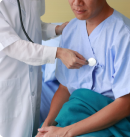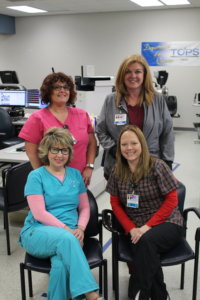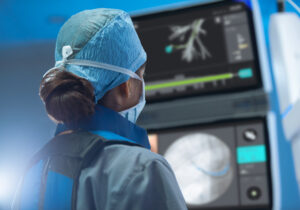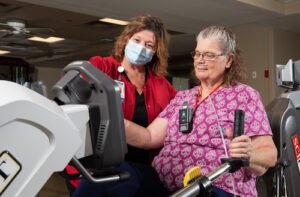Pulmonary Rehabilitation
When you have some type of medical condition impacting your lungs, you logically want a team of experts who can help you breathe easier. You can access that care through the Pulmonary Rehabilitation Program at West Tennessee Healthcare.
Though Pulmonary Rehabilitation cannot cure lung disease, it can help people make the most of their limited lung function. Over time, it can lead to easier breathing and less frequent breathing challenges. The outpatient Pulmonary Rehabilitation program is an exercise and education program designed to enhance quality of life to the highest possible level. The exercise program is designed just for you by your physician, with the help of a registered nurse, to help increase your independence and understanding of pulmonary dysfunction.
Who needs Pulmonary Rehab?
You can benefit from Pulmonary Rehab if:
- You have Chronic Obstructive Pulmonary Disease (COPD), which refers to a group of lung diseases that block air and make it more difficult to breathe
- Emphysema
- Chronic Bronchitis
- Asthma
- Pulmonary Fibrosis
- Pre and Post Lung Transplant
- Chronic Respiratory Failure
- Restrictive Lung Disease
- Obesity Hypoventilation Syndrome
- Plus Other Respiratory Diagnoses
Specialized Rehabilitation for Lung Health
If you’ve experienced some type of medical condition affecting your lungs, such as emphysema, chronic bronchitis, asthma, pulmonary fibrosis, or COPD, you may find yourself struggling to recover. Pulmonary rehab is specially designed to help patients with lung diseases and those recovering after lung surgery improve their quality of life and reduce their symptoms. Those experiencing lung issues following a COVID-19 diagnosis can also benefit.
During this outpatient program, participants take part in supervised and monitored exercise, paired with educational sessions about managing lung disease, breathing more efficiently, and improving well-being. Our goal is to equip you with the information and resources you need to live your best life.
Comprehensive Resources to Help Improve Quality of Life
Lung diseases and lung-related surgical procedures can impact the very essence of living—the way you breathe. Through the Pulmonary Rehabilitation Program, participants learn proper breathing techniques, steps for conserving energy in daily life, endurance exercises, and how to identify and respond to signs of fatigue.
Pulmonary rehab provides patients with a personalized strategy for breathing easier, with special attention on: 
- Becoming more independent
- Decreasing symptoms
- Decreasing the risk of hospitalization and the need for emergency care
- Improving quality of life
- Increasing exercise tolerance
- Understanding your lung health condition
Who will be working with me?
 Exercise sessions are telemetry monitored, and you will be supervised by registered nurses who are Certified in Advanced Cardiac Life Support. The nurses will help you through each exercise session, talk with you about your concerns and keep you and your physician informed about your individual program.
Exercise sessions are telemetry monitored, and you will be supervised by registered nurses who are Certified in Advanced Cardiac Life Support. The nurses will help you through each exercise session, talk with you about your concerns and keep you and your physician informed about your individual program.
You will also be given the opportunity to interact with dieticians, respiratory therapists, pharmacists, physicians, and nurses during educational sessions. Topics include:
- Proper Nutrition
- Detailed Breathing Retraining
- Infection Prevention and Bronchial Hygiene
- Respiratory Medications
- Energy-Conservation Techniques
How do I get started?
All patients must have a written referral from their physician for Pulmonary Rehabilitation; you can then be scheduled for an evaluation. Exercise sessions are two times a week, and the nurse will appoint times that are convenient for you. It is typically an 18-week program for approximately one hour. Patients may receive up to 36 visits. A physician referral is required.
Lung Nodule Clinic
WTH offers the only comprehensive lung nodule program in the region, using the most advanced diagnostic equipment available anywhere in the world. The Lung Nodule Clinic at West Tennessee Healthcare helps patients through every step of lung nodule diagnosis and treatment and offers smoking cessation services as well. Lung nodules, or abnormal growths in the lungs, are very common and can be benign or cancerous. Most patients don’t experience any symptoms with small lung nodules, and early diagnosis and prompt care has been proven to save lives with cancerous nodules.
Through the Lung Nodule Clinic and other pulmonology services, patients have access to a extensive range of diagnostic and treatment options. These include a low dose computed tomography (CT) scanning for detection of lung cancer and other conditions as well as pulmonary rehab and expert treatment of asthma and COPD.
The Lung Nodule/Thoracic Oncology program is a multidisciplinary team of specialists, including pulmonologists, thoracic surgeons, radiologists, oncologists and more. There is even a nurse navigator to help guide patients and families throughout the care process, from the initial appointment through observation and treatment.
Your doctor may recommend a lung biopsy if a lung nodule appears on a lung cancer screening test. A nodule may also appear on a chest X-ray or CT scan performed for other reasons. 
During a lung biopsy, your doctor removes a sample of cells from the nodule. The sample is analyzed under a microscope to determine if cancer cells are present. If cancer cells are present, examining the cells allows doctors to determine the lung cancer type.
There are several ways doctors can perform a lung biopsy. You should discuss your options with your doctor to determine which approach is best for you.

